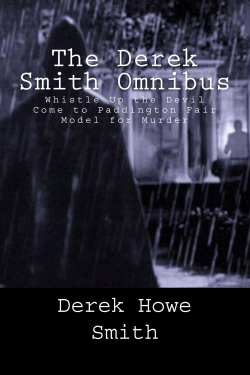Derek Smith (1926-2002) was a reclusive character with poor health but a fertile mind, who turned his hand to writing mystery fiction while in convalescence, after being invalided out of the army in the late 1940’s. His chosen field was locked room mysteries, about which he possessed a truly phenomenal knowledge. He tried both short stories and novels, only one of which ever saw publication in his native land. But that single exception has earned him a place in the pantheon of locked room authors.
Whistle Up the Devil (1953) pops up regularly in “Best of” lists, and for good reason. Publisher’s Weekly’s (starred) June 30 review calls it “one of the most intelligent and crafty impossible murder novels of all time.” Lacourbe et al’s 1001 Chambres Closes ranks it among the masterpieces. No locked-room library is complete without a copy.
Come to Paddington Fair, probably written in the same period, never found a publisher in the English-speaking world. Ironically, it was left to a discerning Japanese collector and reviewer, Hidetoshi Mori, who regarded it as an impossible crime masterpiece, to publish it privately (in English). It involves “a clever murder committed in plain sight on a London stage during a performance” (PW again).
Model for Murder (1952) appears to have been Derek’s first novel, specifically written for the Sexton Blake market. Sexton Blake (“the poor man’s Sherlock Holmes’) was the fearless detective hero of over 4,000 stories by more than 200 authors of whom Derek, alas, was not destined to be one. His manuscript was rejected, possibly because it was too cerebral for the intended audience. Nevertheless, it is a well-written story with a solid locked room element.
The omnibus itself was the result of detective work. Having long admired Derek’s novels (thanks to Bob Adey I had photocopies of Model for Murder and Come to Paddington Fair and owned a copy of Whistle Up the Devil), I decided to try to locate the owner of the rights to see if they would agree to publication by LRI. Bob, who knew Derek better than anyone, had given me the phone number of his one-time solicitor. They were unable to give me any specifics, but steered me in the direction of the UK Probate Registry. Two months after filling out a printed on-line form and forking out the princely sum of 6 GBP (which included mailing to anywhere in the world), I received a copy of Derek’s will in the mail.
I was stunned to find I knew the owner of the rights: Derek had bequeathed the rights of all his published and unpublished writings to Douglas G. Greene, well-known to mystery fans as the owner of Crippen & Landru. Doug, with whom I have been communicating for nearly 10 years, was thunderstruck when I told him. He could not understand why the executors had neglected their basic duty to inform him. After digesting the news, he graciously invited me to publish the stories and I, of course, agreed. Doug suggested publishing all three novels in an omnibus, which turned out to be a smart decision because it allowed us to qualify for reviews from Publisher’s Weekly and two other periodicals. We are both delighted that Derek Smith will get another chance to be read, and I am deeply grateful to Doug for the opportunity.
*Yes, I know it says Locked Room International, but that doesn’t preclude British writers. I’m looking at another one for 2015…
The Derek Smith Omnibus

